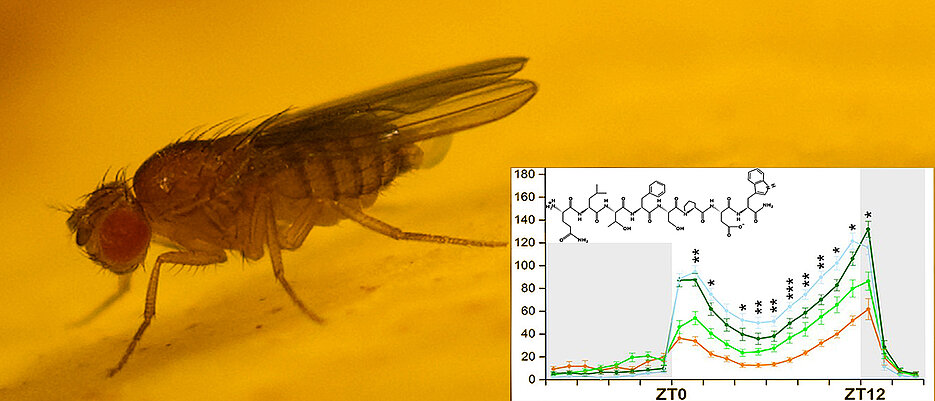Energy for undisturbed rest
07/29/2021In the fruit fly Drosophila, a hormone helps to balance rest and activity. This is shown by a new study of a research team led by the University of Würzburg. Might humans have a hormone with comparable function?

Searching for food, eating, resting: in rough terms, this is the rhythm of life that many animals follow. Well coordinated, these three phases ensure the necessary balance between energy production - eating - and energy consumption - daily activity. This interplay requires a clear timing schedule. After all, it wouldn't make sense to go on food search hungry while it's time to sleep.
Which neuro-physiological processes and structures regulate the temporal coordination of behaviour: This question is the focus of researchers at the Chair of Neurobiology and Genetics at the Julius Maximilians University of Würzburg (JMU). They use the fruit fly Drosophila melanogaster as their main model, as it is easy to manipulate genetically. Christian Wegener is a professor at the chair and focuses on neuropeptide signal systems that are involved in the timing between internal clocks, behaviour and metabolism in the fruit fly.
Balance between periods of rest and foraging
Now the working group around Wegener and his colleague Dr. Dennis Pauls, in collaboration with partners at the Chair of Pharmaceutical Biology and the Universities of Leipzig, Uppsala and Graz, succeeded in identifying a hormonal control loop that is involved in the balance between resting phases and foraging or feeding. The team presents the results of its work in the current issue of the journal Current Biology.
For the new study, the scientists combined neurogenetic, microscopic and metabolomic methods to look closer at a hormone that is necessary for the supply of energy - the so-called adipokinetic hormone AKH. This hormone performs functions in the fly similar to mammalian glucagon.
"AKH ensures that the fly does not run out of energy during times of starvation by releasing sugar from its fat body via a special control circuit," explains Wegener. At the same time, AKH activates certain aminergic neurons of a stress system in Drosophila. "We have now been able to show that AKH balances both the food intake and the activity level of the fruit flies via these two different pathways," says Pauls, who has meanwhile moved to the University of Leipzig.
Hormone blockade leads to shorter rest at night
If the researchers switched off the AKH-dependent energy mobilization with a genetic trick, the flies had a shorter resting phase during the night as a result. Flies became active early at the end of the night to search for food. “AKH seems to stabilize rest by making energy available from the fat body during the night, when the animals do not eat”, Wegener interprets the result.
In another experiment, the scientists switched off the AKH-dependent activation of the fruit flies stress system. The result: "The animals showed reduced physical activity during the day." Pauls and Wegener conclude that the hormone AKH not only provides the energy for physical activity during the day, but also stimulates this activity itself.
Thus, on the one hand, the hormone increases the activity of the fly by stimulating special neurons in a stress system. On the other hand, the signal mobilizes the supply of energy in the form of sugar from the fat body in phases of lack of food and thus ensures, among other things, an undisturbed sleep by at least not waking the fly from feelings of hunger.
Accordingly, the researchers conclude: "Our results add a new facet to the already known, versatile regulatory functions of AKH-producing cells by showing that their output contributes to shaping the daily activity pattern with free access to food."
Interaction between sleep quality and obesity
The relationship between fruit flies and humans does not seem too close, at least for the layperson. Yet, at the cellular and physiological level, there is good evidence to suggest that comparable signaling pathways might be found in humans. “Humans have similar metabolic hormones, such as glucagon,” says Wegener. The results of the fly study thus suggests that these hormones may play a role in stabilizing rest and sleep in humans and other mammals. This conclusion is also supported by the well documented interaction between sleep quality and metabolic disorders in humans.
Original publication
Endocrine signals fine-tune daily activity patterns in Drosophila. Dennis Pauls, Mareike Selcho, Johanna Räderscheidt, Kelechi M. Amatobi, Agnes Fekete, Markus Krischke, Christiane Hermann-Luibl, Ayten Gizem Ozbek-Unal, Nadine Ehmann, Pavel M. Itskov, Robert J. Kittel, Charlotte Helfrich-Förster, Ronald P. Kühnlein, Martin J. Mueller and Christian Wegener, Current Biology. DOI: https://doi.org/10.1016/j.cub.2021.07.002
Contact
Prof. Dr. Christian Wegener, Chair of Neurobiology and Genetics, T: +49 931 31-85380, christian.wegener@uni-wuerzburg.de






